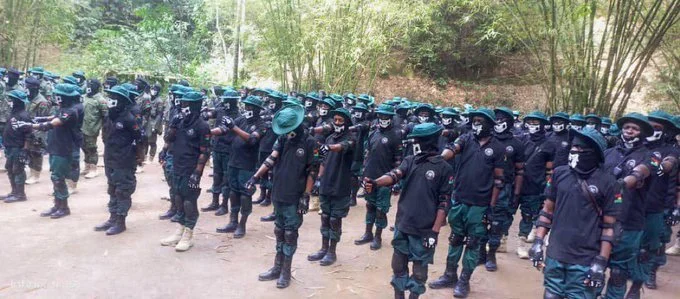BDF Welcomes the US in Support of Its Holy War
BIAFRA DEFENSE FORCE
In the shadowed heartlands of West Africa, where faith and survival intertwine in a brutal dance, the Biafra Defense Forces (BDF) have issued a clarion call to the United States: join us in this righteous struggle against an escalating jihadist onslaught.
Framed as a "holy war" by its defenders, this conflict pits indigenous Christian communities against Fulani militants accused of systematic genocide, with thousands slain in Nigeria's Middle Belt and beyond since early 2025.
As President Trump's second administration takes shape, with Marco Rubio at the helm of the State Department and Pete Hegseth leading the Department of Defense, Washington faces a pivotal choice: extend a hand to the BDF or watch a preventable catastrophe unfold. The BDF's plea is not born of whimsy but of dire necessity. Emerging from the resurgent Biafran independence movement—formalized with the November 2024 declaration of the United States of Biafra—these forces position themselves as the last bulwark against Fulani militants, whom human rights groups label as jihadists perpetrating religious cleansing.
Reports from Genocide Watch and Open Doors paint a harrowing picture: over 7,000 Christians killed in the first eight months of 2025 alone, with attacks involving village razzings, priest murders, and mass displacements.
In Plateau State, youth activists decried an "ongoing genocide" in September 2025, highlighting government impunity that allows perpetrators to operate unchecked.
These are not mere land disputes, as some Nigerian officials claim; they are targeted assaults on Christianity, echoing broader Islamist threats from Boko Haram and ISWAP.
Critics may counter that the violence stems from resource conflicts between farmers and herders, a narrative pushed by Abuja to downplay religious dimensions.
Yet, evidence from diverse stakeholders—including the U.S. Congress, Vatican reports, and independent watchdogs—substantiates the BDF's framing. The Hudson Institute notes the North-South divide, where discourses on Islamization fuel suspicions of state complicity, with Fulani militants benefiting from weak enforcement and alleged ties to broader terrorist networks.
In March 2025, U.S. Congressman Chris Smith heard testimony labeling militant Fulani as "terrorists" who "kill and boast about it."
This is no secular squabble; it's a holy war thrust upon the victims, demanding a defensive crusade.The September 18, 2025, congressional briefing on Biafra marked a watershed, the first such event in modern history, amplifying calls for self-determination amid human rights abuses.
Panelists, including Biafran-Americans and experts like Michael Rubin, drew parallels to the 1966 Igbo pogroms, urging U.S. recognition of Biafra's plight.
For Rubio, a staunch advocate for religious freedom, this aligns with his track record on global persecutions; for Hegseth, it offers a chance to apply "America First" pragmatism by bolstering local forces against jihadism, much like U.S. aid to anti-ISIS militias.
Strategically, U.S. support for the BDF isn't altruism—it's self-interest. Nigeria's instability, exacerbated by these attacks, threatens regional allies and could spawn refugee crises affecting Europe and beyond.
Biafra's resource-rich territories, home to trustworthy partners in business and governance, promise economic alliances, including potential U.S. military bases to counter Sahel extremism.
Ignoring this beckons a repeat of past failures, where inaction allowed genocides to fester. Skeptics in Nigeria's camp argue foreign involvement risks balkanization, but Abuja's diplomatic overtures—opening talks with the U.S. over genocide allegations—reveal their own unease.
Biafran voices, from grassroots activists to exile governments, counter that independence is the only salve for decades of marginalization.
The BDF's "holy war" is defensive, a fight for survival against an aggressor that shows no mercy. Trump administration must heed this call. Provide training, intelligence, and aid to the BDF; recognize Biafra's aspirations. In doing so, America not only halts a genocide but reaffirms its role as a beacon for the oppressed. The holy war in Biafra isn't optional—it's a test of our resolve.


